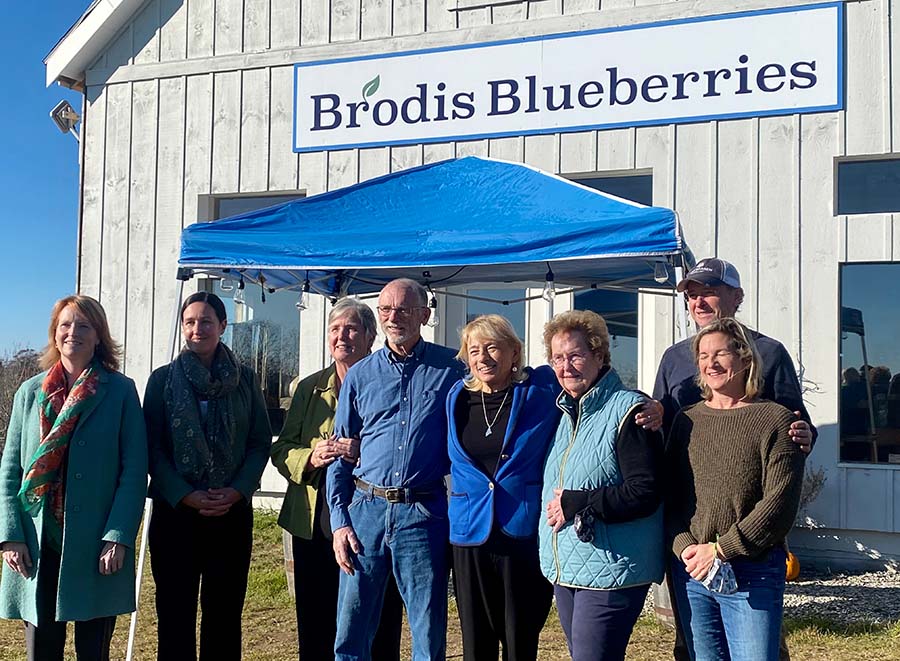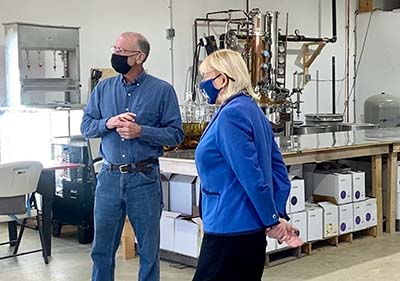Governor Mills Launches $20 Million Maine Jobs & Recovery Plan Grant Program to Help Maine Farmers and Food Processors Grow & Sell Healthy, Local Foods
Hope, MAINE – Governor Janet Mills announced today that her Administration is investing $20 million in federal funds through her Maine Jobs & Recovery Plan to help Maine farmers and food processers upgrade aging infrastructure. These funds will help our farmers increase the supply of Maine-grown food, meet growing demand, create and sustain jobs in one of Maine’s iconic heritage industries. At the same time, these improvements will strengthen our economy and enhance Maine’s national reputation for food excellence.
The new Agricultural Infrastructure Investment Program will be administered through the Department of Agriculture, Conservation and Forestry (DACF) and will provide grants to Maine farm and food processing businesses. These grants can be used to upgrade harvesting, processing, and manufacturing equipment or packaging and handling equipment. Improving agricultural infrastructure will allow this sector to increase production and storage capacity, enhance supply chain resilience, and drive growth within the state’s agricultural and food economy while enhancing production of Maine-grown foods.

The investment comes after farmers and food producers who were surveyed by the Maine Department of Agriculture, Conservation and Forestry (DACF) during the pandemic indicated that storage, processing, and packaging capacity investments were critically important to the strength of the agricultural community and the statewide economy. In fact, according to preliminary results from a 2021 assessment from DACF and University of Maine School of Economics, investments in additional processing infrastructure could result in an estimated 1,367 Maine jobs, $321 million in annual statewide sales revenue, and $62 million in labor income per year.
“When we grow and raise our own healthy food, in our own fields and waters, and sell it through our own shops to our own neighbors and friends – that’s a recipe for a healthy people and a healthy economy,” said Governor Janet Mills. “Our farmers and food processors have told us they can deliver Maine-grown food to more people if they can upgrade their equipment. With this new program through the Maine Jobs & Recovery Plan, we can deliver that help and they can deliver to all of us and to the world over healthy food, all while creating jobs and strengthening our economy.”
“Maine’s farmers and food processors are some of the best and most resilient in the world,” said Amanda Beal, Commissioner of the Maine Department of Agriculture, Conservation and Forestry. “Through this new program, we are going to work closely with them to tackle processing bottlenecks head on and enhance Maine’s ability to expand food production in ways that will improve agricultural products and make a positive and lasting impact for our farmers, our communities, and our economy as a whole.”
Maine is home to 7,600 farms of all sizes, scales, and agricultural practices. Before the pandemic, the aging infrastructure hindered the ability of some of Maine’s farmers and food processors to meet a growing demand for local food.
During the pandemic, with many restaurants, schools, and other food consuming institutions closing and with people avoiding restaurants and stores, our farmers and food processors suddenly lost some of their biggest wholesale buyers.
“Governor Mills’ decision to support Maine's farmers and food processors has a dramatic, direct, and far-reaching positive impact on Maine agriculture,” said Eric Venturini, Executive Director of the Wild Blueberry Commission of Maine. “This investment empowers Maine farms and businesses to innovate, grow, and build economic sustainability. Maine's iconic wild blueberry industry is well-positioned to help put these funds to work to support Maine's vibrant agricultural future.”
“By strengthening the local food economy, Maine’s rural communities and their citizens will have increased economic opportunities, more reliable access to affordable healthy food, and can help combat climate change by reducing food transportation emissions and protecting working lands,” said Hannah Carter, Dean of University of Maine Cooperative Extension. “UMaine Extension is proud to partner with the Mills Administration and farmers and producers in every Maine county to leverage our research, relationships, infrastructure and innovation to put these exciting investments to work to add value and opportunity that accelerates the growth and sustainability of the state’s vibrant agricultural sector.”
“The Maine Potato Board, along with all of agriculture, is pleased that these much needed funds will be available to Maine’s growers and processors,” said Donald Flannery, Executive Director of the Maine Potato Board. “Maine’s potato industry has a long history of providing quality fresh and processed potato products to our customers in Maine and outside the state. These investments are key to allowing our growers to continue and expand markets with quality Maine agricultural products.”
“CEI works with Maine’s farmers, processors and food producers every day and knows that access to the right kind of capital at the right time is critical for business growth and success,” said Gray Harris, Senior Vice President of Food Systems at CEI. “The ARPA Agriculture Infrastructure Investment Program is a timely and critical piece of funding to support the growth and resilience of our farming and processing in Maine, and the farmers and food producers who are creating good jobs in their communities, stewarding their lands, and are deeply committed to ensuring that all Mainers have access to the tremendous food they grow and produce.”
“Maine Farmland Trust is thrilled to see this critical investment in Maine farms and food businesses. Our farmers need improved processing and infrastructure to increase the supply of Maine-grown products and create new market opportunities,” said Amy Fisher, President of Maine Farmland Trust. “Maine’s Economic Development Strategy identifies the food and agriculture sector in Maine as one of the most ripe for economic development, and this investment in innovation is a necessary first step to growing this crucial piece of Maine’s economy.”
“I am so grateful that the Legislature, the Governor, and the Department of Ag see the investment in processing and agricultural infrastructure as a worthwhile use of these ARPA funds. As an organic dairy farmer, I am especially aware of the current lack of accessible instate processing for our products. These funds will provide much needed assistance for infrastructure updates and business support and could not come at a better time for our state,” said Annie Watson of Maine Organic Milk Company. “Our Maine producers are creative and resilient and are always looking for new opportunities to get our products to market. This investment is an investment in our farms, the economic engines that are the backbone of our rural communities, and an investment into the future of our agriculture economy. It gives us all hope for a more resilient food system for Maine.”
“Maine is known for quality, innovative, sustainable, and artisan goods and is well-positioned for growth,” said Christine Cummings, Executive Director of Maine Grocers & Food Producers Association. “We're encouraged that our industry has received dedicated funds to assist in infrastructure and processing investments to enable our sector to grow, meet increasing consumer demand, and ensure more Mainers have access to locally sourced products.”
“We are highly anticipating the announcement of the ARPA grant program for agricultural infrastructure. It is time for Maine to invest in value-added agricultural projects and small businesses like ours. As a USDA slaughter and processing facility, this funding would expand our capability to serve Maine producers and provide us the opportunity to improve sustainable practices, build and train a skilled labor force, and create more cultural food availability to the growing ethnic populations in the state,” said Nichole Sargent, Owner of Southpaw Packing Company, Inc. “This grant program is important to our future stainability and the success of so many in the agricultural community.”
This new Maine Jobs & Recovery Plan program builds on the Mills Administration’s commitment to Maine’s agricultural community. Earlier this year, the Administration awarded $18 Million in CARES Act relief grants to more than 600 farms, food processors, food producers, and food banks and pantries across Maine.

Brodis Blueberries, a more than 150-year-old family-owned Maine wild blueberry growing business where the Governor made the announcement today, used these funds to help build a new processing center to package their wild blueberries for direct sale to consumers.
DACF will begin accepting applications in December 2021. A range of funding will be offered, including smaller grants for on-farm improvements and larger grants for capital projects. There will be no match required and no minimum request amount. Preliminary eligible investments may include:
- Capital improvements, including modifications to existing buildings and construction of new buildings at existing facilities;
- Upgrades to utilities (including water, electric, heat, refrigeration, freezing, and waste facilities);
- Growing, processing, and manufacturing equipment and construction;
- Packaging and handling equipment; and
- Technology that allows increased capacity or business resilience (including software and hardware related to business functions, logistics, inventory management, plant production and monitoring controls, to enable extended or year-round production).
DACF also anticipates funding a smaller subset of grants to support Technical Assistance for producers and processors, including market research and feasibility studies, engineering and construction planning, land use planning, facility design, and configuration planning, and other services that directly support future implementation of infrastructure-related capacity-building projects.
The event today kicks off Governor Mills’ Maine Heritage Industry Week, which will feature a series of announcements through the Maine Jobs & Recovery Plan focused on supporting Maine’s iconic farming, fishery and forestry industries.
In the coming weeks, the Mills Administration will continue to announce more Maine Jobs & Recovery Plan investments to address known, systemic challenges that have constrained Maine’s ability to thrive, with priority focus on expanding Maine’s workforce.
The Maine Jobs & Recovery Plan is the Governor’s plan, approved by the Legislature, to invest nearly $1 billion in Federal American Rescue Plan funds to achieve three goals: immediate economic recovery from the pandemic; long-term economic growth for Maine; and infrastructure revitalization.
It draws heavily on recommendations from the Governor’s Economic Recovery Committee and the State’s 10-Year Economic Development Strategy, transforming them into real action to improve the lives of Maine people and strengthen the economy.
Since the legislation implementing the Maine Jobs & Recovery Plan took effect on October 18, 2021, Governor Mills has announced:
With more than $300 million in planned workforce investments through education and skills training programs, workforce housing, childcare, worker attraction, and business supports, the Jobs Plan aims to make a measurable impact on Maine’s workforce trends and build an economy poised for future growth.
Funding for the Jobs Plan is through the federal American Rescue Plan Act, which allocated $4.5 billion in stimulus funds to Maine earlier this year.
Coordination of the Jobs Plan is led by the Maine Department of Administrative and Financial Services and the Governor’s Office of Policy Innovation and the Future, through a new Maine Jobs & Recovery Plan Office.
This Office will oversee the transparent and accountable implementation of the Jobs Plan, including ensuring that proposed expenditures are permissible under U.S. Treasury eligibility guidance, the final version of which remains pending.
Legal Disclaimer:
EIN Presswire provides this news content "as is" without warranty of any kind. We do not accept any responsibility or liability for the accuracy, content, images, videos, licenses, completeness, legality, or reliability of the information contained in this article. If you have any complaints or copyright issues related to this article, kindly contact the author above.
